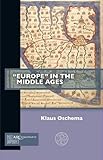Europe in the Middle Ages / Klaus Oschema.
Material type: TextSeries: Past imperfect (ARC Humanities Press)Publisher: Leeds : Arc Humanities Press, [2023]Description: 1 online resource (136 pages): illustrations (black and white)Content type:
TextSeries: Past imperfect (ARC Humanities Press)Publisher: Leeds : Arc Humanities Press, [2023]Description: 1 online resource (136 pages): illustrations (black and white)Content type: - text
- computer
- online resource
- 1802701354
- 9781802701357
- 9781802701364
- 1802701362
- 940.1 23/eng/20230707
- D102 .O83 2023
Includes bibliographical references.
From the nineteenth century onwards, historians described the Middle Ages as the "cradle" of the nation state - then, after World War II, they increasingly identified the period as the "cradle" of Europe. A close look at the sources demonstrates that both interpretations are misleading: while "Europe" was not a rare word, its use simply does not follow modern expectations. This volume contrasts modern historians' constructions of "Europe in the Middle Ages" with a fresh analysis of the medieval sources and discourses. The results force us to recognize that medieval ideas of ordering the world differ from modern expectations, thereby inviting us to reflect upon the use and limits of history in contemporary political discourse.0.
Description based on online resource; title from digital title page (viewed on July 13, 2023).
Cover -- Contents -- List of Illustrations -- Preface and Acknowledgements -- Chapter 1. Why Europe? A Concept Crossing History and Politics -- Chapter 2. Foundations in Antiquity -- Chapter 3. Moments of Transformation-Europe in the Early Middle Ages -- Chapter 4. Europe, Christianity, or Something Completely Different? Impressions from the Central Middle Ages -- Chapter 5. Our Last Hope? Entangling Europe and Christianity in the Late Middle Ages -- Chapter 6. Perspectives from Outside? Byzantium and the Arabic World
Conclusion No Roadmap for Europe-History, Politics, and the Wayto Global History -- Further Reading
Added to collection customer.56279.3
There are no comments on this title.

